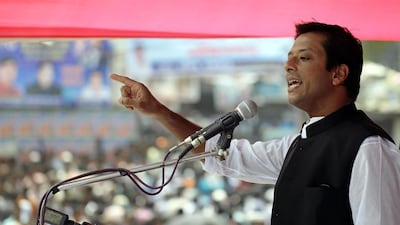Political power in Bangladesh has swung back and forth between two families since 1991. That is unlikely to change at next year’s election – and in the longer term, the next generation of both dynasties is just waiting to take control
DHAKA // The future of Bangladesh depends on two men who do not live there, the heirs apparent to the South-Asian nation’s most powerful political dynasties.
One is a technology consultant who lives in the United States with his American wife and young daughter.
The other is reportedly studying for a law degree in London, living in self-imposed exile because he faces corruption charges at home.
The consultant has been visiting small towns in Bangladesh in recent weeks, campaigning for his mother’s re-election.
The law student is meeting with powerful political aides in Saudi Arabia, helping to plan his family’s return to power.
But give them a few years, political observers say, and either could become the prime minister of Bangladesh, which has been ruled by their families since independence from Pakistan in 1971.
Sajeeb Wazed Joy, 42, the son of the prime minister, Sheikh Hasina, and Tarique Rahman, 46, the son of opposition leader Khaleda Zia, have emerged as the country’s most powerful political heirs.
“Their influence is huge,” said Hassan Shahriar, a political analyst in Bangladesh. “It’s almost impossible to rise to the top coming from outside these families in the current context.”
With national elections due by early next year, Mr Joy and Mr Rahman are key figures in their mothers’ campaigns, and are earning much publicity for themselves.
The indications are that the men are headed for powerful roles in the country’s two major political parties – Ms Hasina’s Bangladesh Awami League and Ms Zia’s Bangladesh Nationalist Party (BNP).
The seeming inevitability of the sons’ rise rankles with some in Bangladesh, who see it as fundamentally undemocratic.
“This is not a kingdom, why would they come after their mothers?” asks Mazharul Islam, a college student. “Are there no other people with brains and guts to rule us? This is ridiculous.”
But political dynasties are a fact of life in South Asia. Families of independence leaders, first presidents or descendants of longtime leaders often have immense influence in politics. In Bangladesh, Ms Hasina and Ms Zia have led their parties for decades without any open challenges.
“Look at India, Sri Lanka or Pakistan,” Mr Shahriar said. “Bangladesh is no different. Cronies surround these families, back them and strengthen their hands to get slices of power.”
In Bangladesh – a nation struggling to overcome extreme poverty, vicious politics and a recent string of horrific accidents linked to the garment industry – photos of Mr Joy and Mr Rahman feature on party posters with their mothers.
In recent weeks, Mr Joy has toured the country, receiving a rock star-style welcome in towns where supporters lined roads and chanted party slogans. Scrums of reporters followed his motorcade.
“One day he will be prime minister – why not?” said Mahbubul Haque Shakil, an aide to Ms Hasina. “This is a democracy. If people want, he will surely be.”
Mr Rahman will play a major role in deciding who gets nominations for the country’s 300 parliamentary constituencies. He has campaigned for his mother, who was prime minister from 2001 to 2006, and reportedly hand-picked several members of her cabinet.
He left the country in 2008 on medical grounds, with the permission from a court, after his mother’s five-year term expired amid chaos on the streets over elections. A caretaker government backed by the military arrested him and allegedly tortured him in custody.
He is senior vice president of the BNP, despite allegations of corruption that could lead to his arrest if he returns to Bangladesh.
A special court indicted him, along with a businessman friend, in 2011. Prosecutors said the pair had received Dh10 million in bribes while his mother was prime minister. Another court issued an arrest warrant against Mr Rahman, accusing him of masterminding grenade attacks on a rally for Ms Hasina in Dhaka when she was opposition leader in 2004. At least 24 people died in that attack.
Ms Zia’s opposition party has denied all charges against Mr Rahman, saying they are aimed at destroying her family’s reputation.
“It’s just a matter of time. He will return as a hero,” said Jamilur Qadir, one of his supporters.
* Associated Press

